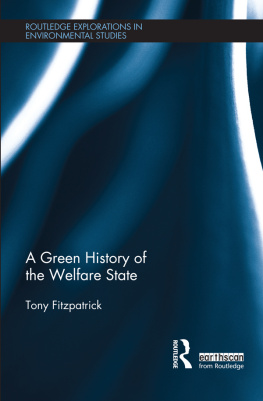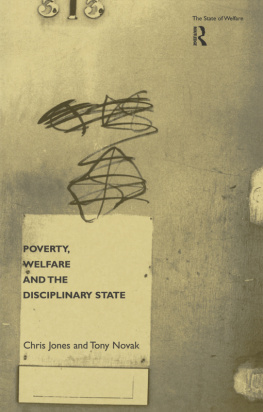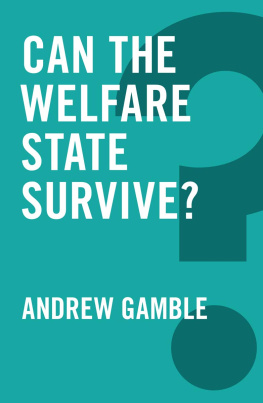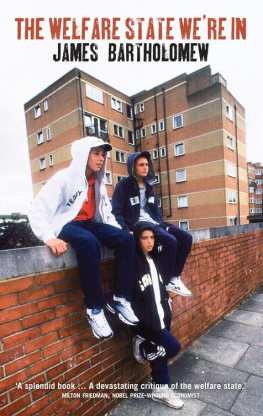THE WINDING ROAD
TO THE WELFARE STATE
The Princeton Economic History of the Western World
Joel Mokyr, Series Editor
The Winding Road
to the Welfare State
Economic Insecurity
and Social Welfare
Policy in Britain
George R. Boyer
PRINCETON UNIVERSITY PRESS
PRINCETON AND OXFORD
Copyright 2019 by Princeton University Press
Published by Princeton University Press
41 William Street, Princeton, New Jersey 08540
6 Oxford Street, Woodstock, Oxfordshire OX20 1TR
press.princeton.edu
All Rights Reserved
Library of Congress Control Number: 2018937063
ISBN 978-0-691-17873-8
British Library Cataloging-in-Publication Data is available
Editorial: Joe Jackson and Samantha Nader
Production Editorial: Jenny Wolkowicki
Jacket art: L.S. Lowry, Returning from Work, 1929.
The Estate of L.S. Lowry. All Rights Reserved, DACS / ARS, 2018
Production: Erin Suydam
Publicity: Tayler Lord and Julia Hall
Copyeditor: Joseph Dahm
This book has been composed in Adobe Text Pro and Gotham
Printed on acid-free paper.
Printed in the United States of America
10 9 8 7 6 5 4 3 2 1
To Janet
and
In Memory of Mary MacKinnon (19592010)
CONTENTS
Contrasts of economic security, involving, as they do, that, while some groups can organize their lives on a settled plan with a reasonable confidence that the plan will be carried out, others live from year to year, week to week, or even day to day, are even more fundamental than contrasts of income.
R. H. TAWNEY, EQUALITY
ACKNOWLEDGMENTS
This book has been a long time in the making. Its beginnings can be traced back to the summer of 2000, when Roderick Floud and Paul Johnson invited me to contribute a chapter on living standards for volume 2 of The Cambridge Economic History of Modern Britain. A few years later the late Frank Lewis kindly gave me the opportunity to contribute a chapter to a volume honoring Stan Engerman. I chose to write on a topic briefly covered in the Living Standards paper, economic insecurity, self-help, and social safety nets in nineteenth-century Britain. When I finally sat down several years later to outline a book on Victorian and Edwardian social welfare policy, I based it on the Engerman paper. I planned for the book to end in 1914, but Tim Hatton, among others, suggested that I extend it to cover the interwar period, the Beveridge Report, and the beginning of the welfare state.
I have accumulated many debts in the process of writing the book, and it is my pleasure to thank publicly those who offered assistance. My largest debts are to Peter Lindert, Jeffrey Williamson, Tim Hatton, Stan Engerman, Joel Mokyr, and the late Mary MacKinnon. Peter read the entire manuscript, parts of it several times, and offered detailed comments and suggestions that have significantly improved it. Jeff and Tim provided helpful comments on draft chapters and on drafts of various papers that went into the book. Several years ago Jeff suggested that I write a book on the history of British social policy; without his encouragement this book might never have been written. As noted above, Tim pushed me to extend the book past 1914, and it was his idea that we construct the new estimates of British unemployment from 1870 to 1913 and beyond that appear at various places in the text. Stan Engerman read and made detailed comments on the manuscript. I am grateful for the accident of geography that placed Rochester only 100 miles from Ithaca, making it easy to drive up to see Stan for working lunches, which are always productive learning experiences as well as fun.
Joel Mokyr is all that can be asked for in an editor. He read the entire manuscript and provided detailed and helpful feedback on what should be added, what revised, and what deleted. The attention that he has given the manuscript has substantially improved it.
My dear friend Mary MacKinnon passed away in 2010, before I began writing the book, and yet she had a large impact on it, as anyone who reads the footnotes will see. Marys D.Phil. thesis was on the Victorian Poor Law, and although over time she moved on from the Poor Laws and concentrated more on Canadian economic history, she continued to read and comment on my papers. Mary was never shy about offering criticism and making suggestions, and her comments always made my papers better. I miss our conversations, and regret that our many discussions never resulted in joint work.
Several other persons commented on drafts of chapters or earlier papers, provided or told me where to find data, answered queries, and helped with sources. They all deserve thanks: the late Charles Feinstein, Stephen Broadberry, Frank Lewis, Humphrey Southall, Paul Johnson, Roderick Floud, Roy Bailey, Chris Hanes, David Mitch, Chris Minns, Ian Keay, Tim Leunig, Michael Huberman, Deirdre McCloskey, Price Fishback, Richard Smith, Susan Wolcott, Jessica Bean, Timothy Schmidle, Andrew Rutten, Robert Hutchens, and Martin Wells. For their helpful comments, I thank the participants at the 2011 Canadian Economic Association meetings, the Sixth World Cliometrics Conference, the All UC Conference on New Comparative Economic History, the 2004 Economic History Association meetings, and the 2004 Conference on Economic History at Queens University, as well as at seminars at Cornell, Binghamton University, Queens University, the University of Mississippi, the University of California, Berkeley, the University of Arizona, and the Washington Area Economic History Seminar. I also thank the two anonymous referees who made many helpful comments on the manuscript.
I would like to thank the staffs of Olin and Catherwood Libraries at Cornell, and in particular the staff of Interlibrary Services, for their assistance in securing monographs and government documents that Cornell does not own. I am especially grateful to whoever in the Cornell Library system made the decision several years ago to purchase the online version of the British Parliamentary Papers. I thank Joan MacKinnon, Marys sister, for lending me her copy of Marys 1984 Oxford D.Phil. thesis. Thanks to Jessica Bean, Max Kiniria, R. Genevieve Quist, and Gleb Drobkov for their excellent research assistance. Thanks also to Darrie OConnell and Sophia Harmon for their assistance in preparing the manuscript and in helping me learn how to use various features of Word. I gratefully acknowledge the assistance and encouragement of my editor at Princeton University Press, Joe Jackson, and the production staff, including Jenny Wolkowicki and Joseph Dahm.
Thanks to several cohorts of students in my course, The Evolution of Social Policy in Britain and America, for putting up with my testing out early versions of some of the ideas in this book before a captive audience. Finally, I want to thank the staff and guests of Loaves and Fishes of Tompkins County, our local community kitchen, for reminding me what is important in life.
Parts of the book have appeared before, in somewhat different form: Poor Relief, Informal Assistance, and Short Time during the Lancashire Cotton Famine, Explorations in Economic History 34 (1997): 5676; New Estimates of British Unemployment, 18701913, Journal of Economic History 62 (2002): 64375 (with Timothy J. Hatton); The Evolution of Unemployment Relief in Great Britain, Journal of Interdisciplinary History 34 (2004): 393433; Poverty among the Elderly in Late Victorian England, Economic History Review 62 (2009): 24978 (with Timothy Schmidle); Work for Their Prime, the Workhouse for Their Age: Old Age Pauperism in Victorian England, Social Science History 40 (2016): 332. I would like to thank the journals for permission to use portions of my earlier work. I also thank Cambridge University Press for allowing me to use portions of the following: Living Standards, 18601939, in Roderick Floud and Paul Johnson, eds.,
Next page








